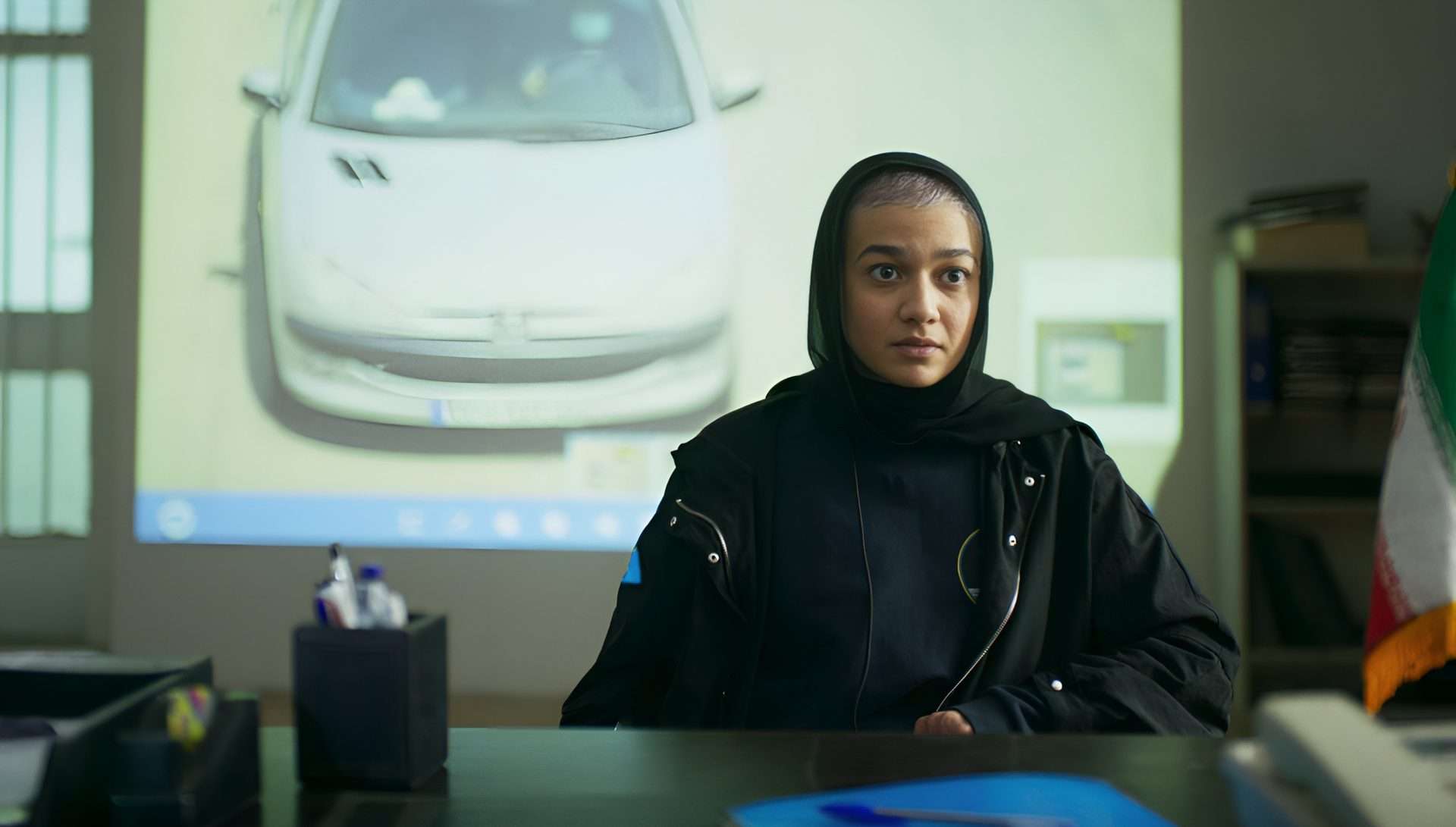A Dolby Atmos-infused atmosphere arises from the opening scene of Terrestrial Verses (a compilation of nine stories), which is earthy and beguiling. Sounds of school bells, traffic, and ambulances deliver a musical mayhem that indicates arguments everywhere. Perhaps it is a warning note for what was coming right after or a summarized orchestra. What’s certain? – a collection of mind-boggling clips is making its way to appear on the screen.
Director Ali Asgari has been providing many ‘social-oppression’ themed films in the past decade for film enthusiasts. The 2013 short film “More than Two Hours” is a notable piece that received many international awards for showcasing individuals in delicate situations. Director Alireza Khatami, who co-wrote the 2022 film “Until Tomorrow” with Ali Asgari, blends similar social themes in his films. A combinational direction by two talented filmmakers elevates Terrestrial Verses to a higher standard.
It opens in a government registration office where a man is subjected to a series of peculiar questions. His request to register his son’s name as ‘David’ becomes the center of a problem that takes a toll on him. The officer questions him with statements like “The name is not Iranian?” and “Why not Hussein?” which pins the headline of the segment. We get the feeling of watching a legal proceeding that is thick in religious politics as a mode of control.
The following entry is titled ‘Selena,’ which focuses on a modern, young girl of schooling age who dances happily in a clothing store. By now, it becomes apparent that director Asgari and Khatami are naming each segment based on the protagonist’s name. Selena’s mother is sorting out the proper attire for Selena’s obligation ceremony, which comes with a series of exceptions. This segment highlights the lack of freedom in clothing for Iranian girls and women. The grooming process holds tight on the choices of color and length of attire that are forced unknowingly. The forced transformation against self-will starts early for Iranian women, evidently from the saleswoman’s dialogue that says, “I’ve done my part; it’s yours now.”
‘Aram’ shows up next in the setting of a school office. Aram is a student called in by the school principal to enquire about a troubling issue. The first question she faces is, “Do you have a boyfriend?”. That sets the segment’s theme, which is to showcase the lack of freedom to love. What starts as a question of love goes right into disciplinary statements, upbringings, lies, and unreliable witnesses. A pandora box is opened throughout the unhealthy argument, which involves negative perceptions and remarks. Director Asgari and Khatami explain that the process of escaping one’s self from a hot soup isn’t the core problem here. The progression of bringing each other down through vulnerabilities due to political restraints of love takes the torch.
Meanwhile, a car confiscation issue arises in the realm of ‘Sadaf,’ which explores gender oppression and lack of privacy for Iranian women. Sadaf goes through an interrogation in a police station with a female interrogator. She intentionally slides in regulatory statements for evidence collection. Sadaf is performed by the daughter of director Ali Asgari, who also acted in two of his previous feature films. The debate of proving her innocence of the offense glides through the issues of wearing hijab and technological surveillance. “Isn’t my car my private space?” and “Your job is depriving me of my livelihood” were statements by Sadaf to highlight the authoritarianism faced by Iranian women. Moreover, Sadaf is subjected to gender oppression due to her shaved head.
The use of single camera shots and the screenplay focusing solely on each segment’s protagonists vividly immerses us into the characters’ reality. The script of the next piece goes right into an interview session in a posh company. Faezeh sits uncomfortably on the sofa as she can’t decipher what the company wants from the job application. Slowly but surely, the truth behind the session appears in front of her eyes. Verbal sexual harassment becomes the backbone of this segment, where Iranian women are subjected to face pleasure-seeking, egotistical men. It seems to be a daylight crime that is tough to prove, which aligns well with the #MeToo movement.
Masculine insecurities pressure Faezeh as the interviewer’s questions intrude into the other’s personal affairs. This segment seems to carry a heavy influence of Asgari’s works more than Khatami’s. ‘Farbod,’ on the other hand, bears Khatami’s signature. Dark humor is amply added in this segment, showcasing an individual wanting to apply for a driving license. The setting of this segment seems like a drama audition with closed doors, which projects a filter episode. Witty answers subject to laughter are the key here, collecting issues arising from various sources. The role of a psychiatrist, the definition of abnormality, and the negative aspects of tattoos are questioned indirectly.
Siamak’s entry shows us the situation of attending an interview from a male perspective in Iran. The influence of piousness emerges in the early stages of the interview, which starts with “Are you a Muslim?” Abnormal requests to prove his religious faith by the interviewer place the misuse of religion over professionalism in a job-searching environment. A section of an applicant’s religion on a form becomes the center of attention throughout the interview, highlighting democratic socialism. ‘Ali’ is probably one of the crucial entries in this film as it highlights the absence of freedom in filmmaking.
The news would have informed that director Ali Asgari has been banned from filmmaking and traveling upon the release of Terrestrial Verses at the Festival de Cannes. This segment covers the plight of Iranian filmmakers. Ali is denied shooting permissions unless an agreement is met with his script. The government representative requests Ali to change the film’s plot by inserting morality and religion as the background. Director Asgari and Khatami emphasize the major injustice that circulates the filming sector in Iran, where art is severely restricted.
The objective of ‘Mehri’ is to find her missing dog, which was captured by the police forcefully. Her only motive is to get her dog back, but it doesn’t seem easy. This episode covers the unsafe living conditions of dogs in Iran due to the implication that dogs are impure. The boundaries between care and legal status are invisible to many dog owners in Iran to the point where dogs are left unnoticed. The sentimental end of this segment speaks more than just the reality of emotional attachments.
Usually, the works of writer George Orwell evoke a sociopolitical awakening. This film offers the same sensation towards the final moment, where an aged man is shown as oblivious to the destruction behind him. Terrestrial Verses, the only 2023 Iranian film nominated under the Un Certain Regard section at Cannes, is more than just a collection of poignant vignettes. It is a framework for showcasing the marginalized in Iran who hail from different social layers and backgrounds to tell us their personal experiences. Their fight for freedom of choice is acquired through their ultimate superpower – always remaining bold in the face of oppression.


![A Twelve-Year Night [2018] – A Heartbreaking Tale of Human Perseverance](https://79468c92.delivery.rocketcdn.me/wp-content/uploads/2019/01/A-Twelve-Year-Night-2018-768x288.jpg)


![Upgrade Review [2018]: An Alarming Glimpse of the Near-Future](https://79468c92.delivery.rocketcdn.me/wp-content/uploads/2018/08/upgrade-screenshot-1-768x432.jpg)
![His Lost Name [2019]: ‘Japan Cuts’ Review- Knitting the ineffable wounds](https://79468c92.delivery.rocketcdn.me/wp-content/uploads/2019/07/p12-hadfield-hislostnamerev-a-20190110-768x512.jpg)
![The Way Back [2020] Review – An Emotionally Satisfying Personal Redemption Story](https://79468c92.delivery.rocketcdn.me/wp-content/uploads/2020/03/The-Way-Back-2020-768x494.jpg)